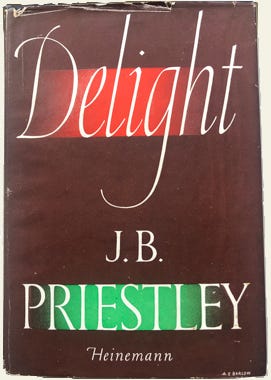What are Everyday Delights?
Little nuggets of Delight in an overwhelming world, with thanks to J B Priestley
A year or so ago I came across J B Priestley’s book Delight (1949, Wm Heinemann Ltd), a collection of 114 (very) short personal essays about things which delighted the prolific author. He wrote it shortly after the War in response to being regarded as an inveterate complainer. The essays are brief, uplifting and gentle, charmingly old-fashioned, a very welcome distraction from the everyday overwhelm.
The stories have the added delight of being excellent writing prompts, and I started to use them in my writing practice. I would read a randomly chosen Delight, and, suitably inspired, write my own loosely related equivalent. Sometimes the spark came quickly, sometimes I had to wait; in some cases I’m still waiting. A number of the essays present quite a challenge, given JBP’s particular experiences, the times he was living through, but I think all of them can spark something. And as with these kinds of sparky exercises, they can release all manner of unexpected memories and feelings, which make for interesting reading, I think. I find them so useful that I was impelled to spread the word. Each of my posts here is my response to one of his stories. I’ve given the title and chapter number of JBP’s essay, written my version, and added a summary of the original.
My invitation to you
Have a read of my versions, (including the summary of JBP’s original at the end), and then respond to whatever is sparked. I recommend around 300 words, and include the word ‘delight’ or some derivative if you can. Then, if you’d like, you can copy your version into the comments on the relevant page. We could amass quite a collection of tiny stories. It would be an honour if you’d join me on this delightful journey. I am so excited to see what turns up.
I can’t include the text of the book as it is still in copyright. A new anniversary version was released in 2023, which you can find here. An electronic archive copy is available to view at internet archive. There seem to be numerous second-hand copies around too. The book I refer to for chapters and page numbers is the 1949 edition. I am not affiliated in any way to anything regarding the book or the author.
Note: A book was published in 2009 called Modern Delights, which features such luminaries as Joan Bakewell and Clive James also presenting their own takes on the essays. I haven’t read this yet.
J B Priestley
John Boynton Priestley, known professionally as J.B.Priestley, was a celebrated British playwright, author, novelist, critic, essayist… a fabulously prolific writer. Born in Bradford in 1894, he was gassed and injured while fighting on the frontline in World War I, then studied at Cambridge before finding huge success as a writer. He served as a very popular broadcaster for the BBC during World War II, and was an influential voice for social change. He died in 1984. You can read more about him here and here.




I love, love, love the concept for your Substack - everyday delights is such a life enhancing and fun idea.
I'm sorry, I couldn't find the prompts, but this is what the idea that gives delight sparked in me.
The idea arrives with a plop, demanding attention.
Where did that come from, she says in surprise. I know I can be impulsive, grabbing hold of big problems, but this is huge!
I can't do this by myself. I will need collaborators. A mathematician and a programmer at least!
The idea stares at her placidly, sure of her excitement.
I will need to ask around if anyone knows anyone suitable...
She lays out the bare bones of the idea, adds flesh to them, pulls and tugs at it. It's time to share the idea.
They meet in the lobby of a hotel to discuss the esoterica associated with the idea. She reels off variables and qualifications in rapid-fire fashion, feeling sure the idea is impossible.
When asked, the man across from her says, Oh yes, I can write those equations. If you can express the idea in words, I can write it in mathematics. Math is just another language.
She seeks for a skilled programmer and finds one, she hopes.
Here is the math, can you write this in code?
Of course, he says. Code is just another language.
The idea takes shape in a series of elegant graphs, expressing the idea's reality in yet another form. This time the thought takes flight on wings of math and code. What she had suspected was true, ...is...true! She laughs in delight, spreads her arms wide, and spins in dizzy circles until she must sit down.
The idea, now clothed in plumage of gold and red reality, comes to rest on her shoulder and preens its gorgeous wings.